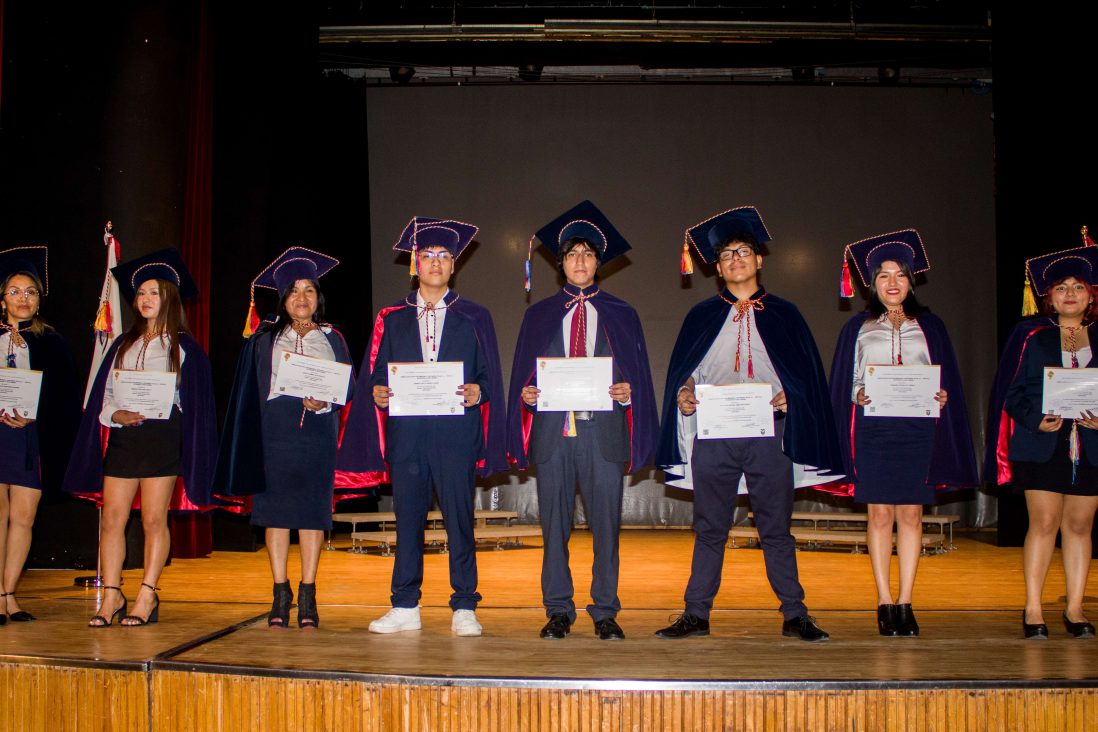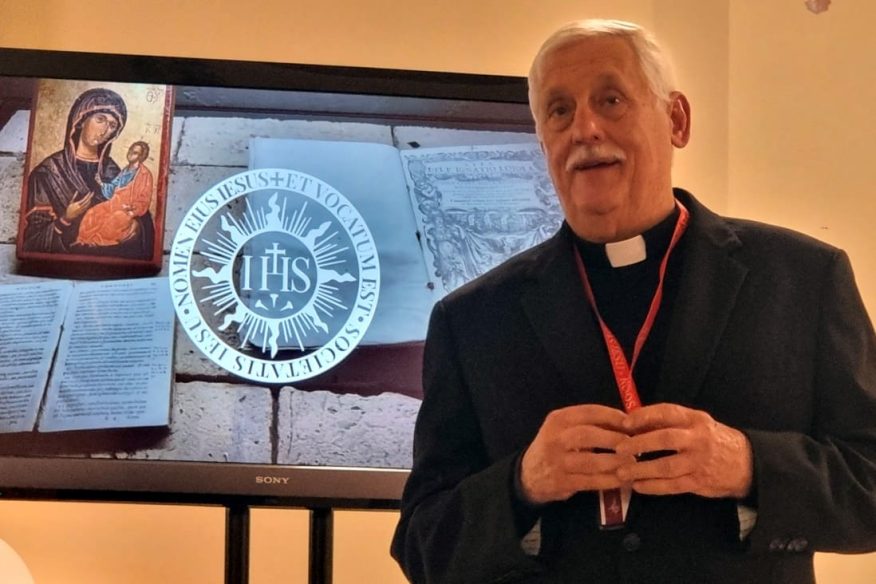Fe y Alegria: everyone’s right to quality education

On Saturday 15th July, 76 Latin American youths and adults from Milan graduated from the IRFEYAL Institute of Fe y Alegria Milan, obtaining a high school diploma that will allow them to continue their studies and have a career in Italy.
For over 22 years, Fe y Alegria Milan, in collaboration with Irfeyal Ecuador and Istituto Leone XIII, has offered a semi in-person study programme with classes on Saturday afternoons and Sundays. “70% of the graduate students are women. The students range in age from 18 to 58 with an average age of 26. They come from Peru, Ecuador, El Salvador, Colombia and Bolivia. Although their path is not easy, they are very resilient and determined. Fe y Alegria Milan, Genoa and Rome are a bridge for Latin American people to continue their human and academic education in Italy,” says Kessia Chamba Castillo, director of Fe y Alegria Milan.
The event was attended by the Consul General of Ecuador in Milan, Ambassador Juan Carlos Castrillón, the Consul General of Peru in Milan, Minister Ana Teresa Lecaros Terry, the Consul of El Salvador in Milan, Dr Julio Martínez, and the Head of Pastoral Care of the Jesuit Education Foundation, Fr Alessandro Viano SJ.
Matteo Andrade Quizhpe, 18 years old from Ecuador, who achieved the highest grades, and whose mother is a former student, says: “I arrived in Italy nine months ago. Thanks to the Irfeyal Fe y Alegria Institute I can pursue my dream of studying computer engineering and grow from a human and professional point of view in Italy”. During the event, a collaboration agreement was signed by the organisers of the cultural event ‘Mi Lindo Ecuador’ to support a student in a vulnerable situation through a scholarship for the school year 2023/2024.
The Mission
Fe y Alegria’s mission is to ensure an integral, inclusive and quality education for young people and adults in vulnerable situations, for the construction of a more equitable world. Latin American youth and adults can complete their secondary education and enter the Italian higher education system or directly into employment. It performs an important service favouring dignity, personal training, and the active inclusion in Italian and European society of people in vulnerable situations.
Learning for all
Within the framework of the Sustainable Development Goals set by the UN through Agenda 2030 Fe y Alegria intends to respond primarily to the need to provide quality, equitable and inclusive education and learning opportunities for all (Goal 4), promoting transformative education for all, regardless of age.
To this end, it aims to contribute to:
- Creating an open and welcoming culture of solidarity that facilitates integration for people in vulnerable situations
- Strengthening participation and global citizenship,
- Promoting processes of empowerment for excluded communities, promoting volunteering as a channel for personal and social participation and transformation; training competent, conscious, critical and committed people who care about others,
- Promoting gender equality through women’s empowerment, education, and equal roles.
The network and objectives
The Fe y Alegria network is composed of the social cooperatives Fe y Alegria Milan, Fe y Alegria Rome and Fe y Alegria Genoa and is part of the three networks, Jesuit Education Foundation, Jesuit Social Network and Federación Internacional Fe y Alegría.
In 1955, “Fe y Alegria” was founded in a poor neighbourhood of Caracas with the donation of a house built by a family of bricklayers to become a school for the poor children of the neighbourhood. Since then, ‘Fe y Alegria’ has built and started up countless schools in Latin America, Europe and Africa, bringing schooling where the asphalt ends, allowing education to those who cannot afford higher education, involving civil society and other entities, ecclesiastical and otherwise, in the realisation of a fundamental and ecumenical work.

From Caracas to Italy
In 2001, the first schools for Latin American foreigners were inaugurated in Rome and Milan and in 2004 in Genoa, to guarantee the possibility of continuing their professional and human growth in Italy.
Adults were left out from the Italian education system due to the incompatibility of timetables with work, the price of public schools and the lack of an objective criterion for incorporation into the Italian system. As for young people, they enrolled in the Institutes of Fe y Alegria after dropping out of other schools where they failed to integrate.
These schools began operating in collaboration with the Fe y Alegria Ecuador Radio Institute (IRFEYAL Ecuador). The educational programme, within the framework of specific multi- and bi-lateral governmental agreements, makes it possible to obtain (over a period of time ranging from a minimum of one to a maximum of thirteen years depending on the pupil’s starting grade) a qualification equivalent to the Italian secondary school diploma, the ‘Bachiller Técnico en Servicios Informáticos’, obtaining a diploma as a ‘computer services technician’. The qualification, which is equivalent to the Italian diploma, is valid for access to Italian or Latin American universities and professional technical training.
The programme
The programme has the following features:
- Teachers who are accredited by the Ministry of Education of Ecuador,
- ‘Semi in-person’ study modality, with lessons at times compatible with work and family commitments, mainly on weekends,
- The possibility of continuing their studies both for young drop-outs and for adults who had to interrupt their studies, even if quite some time ago, to undertake the migrate or for economic reasons,
- The gradual integration into the Italian language, teaching methodology and culture, adapting to both.
In addition, the Rome office has been responsible for an educational project in the Rebibbia prison from its inception, and now runs a Spanish course in collaboration with the Instituto Cervantes.
In 2016, Fe y Alegría in Italy became a structured network, composed of three social cooperatives, Fe y Alegría Genoa, Fe y Alegría Milan and Fe y Alegría Rome. In the same year, it began to join the three networks, Jesuit Education Foundation, Federación Internacional Fe y Alegria and Jesuit Social Network.
Services
Primary and secondary schools in Milan, Genoa and Rome
In Italy these schools provide an important service to Latin American immigrants in view of their dignity, personal formation and active integration into Italian and European society. This method and experience draws on the educational tradition of the Society of Jesus (Jesuits), which since the time of its founder, St. Ignatius of Loyola, has wanted to create a system of schools and educational institutions that is inclusive and open to all. The Global Movement for Education and Social Promotion Fe Y Alegria, born and rooted in South America and later established in Europe and Africa, is therefore inspired by this tradition. Today, the movement is present in 22 countries around the world, including Italy.
Fe y Alegria also offers a series of accompanying and support services such as Global Citizenship Education, study and career guidance and other training courses, including the Spanish course at the Rebibbia Prison in Rome.
Enrolments and staff
In 2022/2023 around four hundred people benefited from the services, including those enrolled in the institutes, training courses and orientation and integration meetings. The predominant recipients are young people and adults from Latin America. In the twenty-two years of school activity, there have been more than a thousand graduates, 75% of whom are women and 40% of whom are mothers. Currently, more than 70% of the students want to go to university and the majority want to stay in Italy.
The students are first and second generation migrants from Ecuador, Peru, the Dominican Republic, Bolivia, El Salvador, Colombia, Mexico, Honduras, Paraguay and Venezuela. To date there are 44 teaching and non-teaching staff involved in the social cooperatives and the network, 35% of whom are volunteers.
